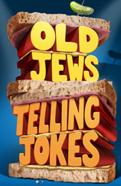Todd Susman on Why Audiences Can't Stop Laughing at Old Jews Telling Jokes
About the author:
If Todd Susman’s voice sounds familiar, it may be because he served as the unseen announcer on M*A*S*H for eight years. A Broadway vet of Hairspray as Wilbur Turnblad, Susman is currently part of the screamingly funny ensemble of the off-Broadway hit Old Jews Telling Jokes. After experiencing this laugh riot first hand, Broadway.com was eager to hear what the show is like for the five folks delivering the jokes at the Westside Theatre—and Susman kindly filled us in on the secret of Old Jews’ success.
![]()
When my agent offered me an audition for Old Jews Telling Jokes, my initial response was silence, then…“Okay.” Something about the title made me feel distinctly…caught. After all, that’s what I am, and what I do rather frequently. “Is someone watching?”
My second reaction was to the enterprise, itself. I figured Dan Okrent and Peter Gethers, the guys who bought the theatrical rights to the OJTJ website and adapted it for stage, were courageous, because they were breaking a cardinal rule of comedy: Don’t introduce a joke by saying it’s the best thing since sliced bread. (That’s what charging money to hear jokes implies.) However, challenging the odds stimulates my admiration, so my curiosity was piqued.
My third reaction involved the content. I knew lots of the jokes in the script, so Okrent and Gethers weren’t reinventing the wheel. What did OJTJ have to sell? The answer reveals itself show after show, setting and resetting the hook that has landed my ardent devotion: We sell fun.
When’s the last time you had any? When’s the last time you had it in bulk? What is fun in the first place? My life is rife with pleasure, but “pleasure” smacks of box seats; fun is a glorious day in the bleachers. I associate pleasure with passive enjoyment—brain function—appreciation. “FUN” beams me back to the “hay high fields” of my youth (Dylan Thomas, “Fern Hill”) where I romp, stomp, whinny and pivot, and toss my mane from side to side.
For the record, I no longer have a mane where it’s supposed to be, but I find OJTJ nonetheless fun. So do like-pated patrons and their furrier fellows. Nearly everyone loves this show, because Borscht Belt humor rings familiar to anybody born and bound to die (old and young); or to anyone upset of stomach or possessed of libido and a mother. Them’s the fixins for “funny-in-common.”
In large part, honesty is responsible for this show’s success, and I like that very much. When selling tickets is a priority, honesty is a lot rarer than fun. If you’ll forgive us the two brilliant youngsters in the cast, one of whom is Catholic, Old Jews Telling Jokes delivers exactly what the title says. If you’re a joke and a Jew short, we’re the show for you.
Many people clamoring to hear our jokes itch to tell their own. One night our technical system went kerplunk, forcing our stage manager to declare an unscheduled intermission. I invited the audience to tell us jokes. They responded instantaneously, some mischievously, others with childlike joy. Various attendees so long to chuckle, they reward us to the point of tears: “Thank you for making us laugh.”
I’m not going to wax on about the world; you live in the same one I do. Times are tough. People need to laugh. But that’s nothing new. Times have been tough since time immemorial. Consider this authentic remnant from the Stone Age:
A caveman marries a woman much bigger than himself. Every time he tries clubbing her into a romantic frame of mind, she grabs the club, knocks him out and throws him out of the cave, literally. The guy’s in constant pain, hasn’t had sex in a year and a half—endures a perpetual erection and clinical depression. One day his friend says, “Stop with the hitting; just take her.” The guy says, “What, and give up foreplay?”
Sometimes jokes are the only hedge against what ails us, so they are protean. Plug in shtup, klop, zetz and tuchus—call the guy Morty, and that joke is Jewish. Shamus, shillelagh (cave on a heather), we’re Irish.
After 65 years of living, the past 42 as an actor, I find it much easier to cry than laugh. I rarely laugh when I think of something funny, but I often cry when I think of something sad. Given the choice, I’d rather laugh. That’s why old Jews Telling Jokes has made me a happier guy. It’s the next best thing to being in the audience.
